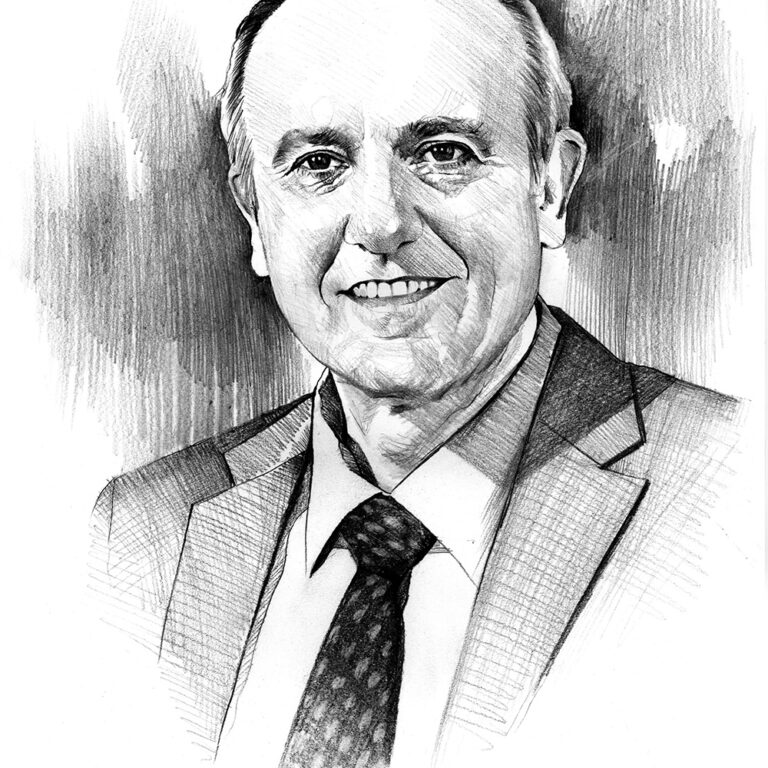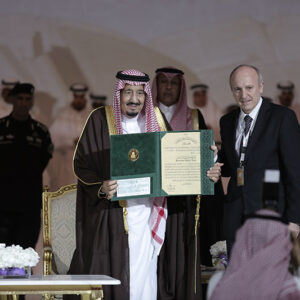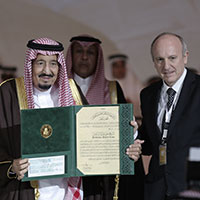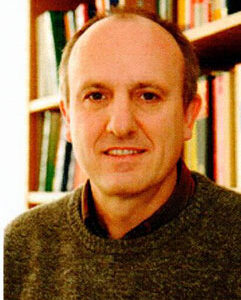

Professor Daniel Loss
King Faisal Prize in Science 2017 Laureate
Topic: "Physics"
A topic which has fascinated me during my whole career is the physics of spins in condensed matter systems

Daniel Loss studied theoretical physics at the University of Zurich (1979-1983) from which he obtained a Ph.D. in Statistical Mechanics in 1985. His academic career spans around 35 years. He worked first as a Post-doctoral Research Associate at Zurich (1985-1989) then moved to the USA as a Postdoctoral Research Fellow (with Nobel Laureate Prof. A. J. Leggett) at the University of Illinois, Urbana (1989-1991) then as a Research Scientist at IBM T. J. Watson Research Center in Yorktown Heights, New York (1991-1993). Thereafter, he was appointed as an Assistant Professor, then as an Associate Professor of Physics (1993-1995; 1995-1996, respectively) at Simon Fraser University in Vancouver, Canada. In 1996, he returned to Basel University as Professor (Ordinarius) of Theoretical Physics and chaired the Department of Physics three times between 1998 and 2010. He has also served as a Co-Director of the Swiss National Center of Competence and Research in Nanoscale Science and is currently a Professor of Theoretical Condensed Matter Physics at Basel University, Director of the Basel
Center for Quantum Computing and Quantum Coherence and Co-Director of the Swiss Nanoscale Center at the Swiss Nanoscience Institute.
Professor Loss has made seminal contributions to the quantum theory of spin dynamics and spin coherence in semiconductors, particularly in quantum dots. Together with D.P. DiVincenzo proposed the concept of a spin quantum computer of exceptionally high speed and storage capacity, using electron spins trapped in quantum dots as qubits. This and many other ground-breaking predictions by Loss and his team have been confirmed experimentally by other groups around the world and have inspired much further research into the basic physics and practical applications of spin-related phenomena and, in particular, spin qubits in developing powerful quantum computers, and in structures such as semiconducting quantum dots, nanowires, carbon nanotubes, graphene, and molecular magnets. Professor Loss has also made pioneering contributions to low-dimensional interacting systems (discovered new states of matter), to topological quantum memories and topological quantum computing based on Majorana fermions and parafermions.
Professor Loss has authored over 435 papers, with a total Web of Science (Google Scholar) citations of 24,830 (35,720) and an H-index of 73 (85). His accomplishments in the field of solid state quantum information processing have been recognized by more than 415 invited talks at international conferences, and by major awards and honors, namely the Humboldt Research Prize (2005), the Marcel Benoist Prize, the highest scientific honor in Switzerland (2010), Simon Distinguished Visiting Scholar KITP (2013) and the Blaise Pascal Medal in Physics from the European Academy of Sciences (2014). He is a Fellow of the American Physical Society (2000) and the Institute of Physics (UK, 2005) and an Elected Member of the European Academy of Sciences (2013) and the German National Academy of Sciences, Leopoldina (2014).
This biography was written in the year the prize was awarded.
He was appointed as the Co-Director of the National Center on Spin Qubits (NCCR SPIN) at the University of Basel & IBM Zurich in 2020.





